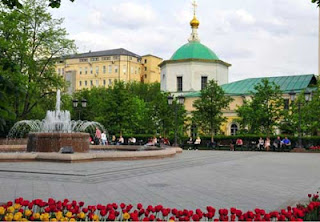We occasionally attend church services at an Orthodox temple right in the center of Moscow's bustling downtown district, just minutes from Red Square. One Sunday, as we stepped out of the church and turned to head back toward the metro via Tverskaya Street, Moscow's main drag, we were met by hundreds of people enthusiastically gathered with megaphones, songs, and communist flags.
Oh, so this is the "protest" to which that Embassy notice referred... "Red rallies" are not at all uncommon here - and very rarely are they in any way dangerous or menacing (this line inserted particularly for grandparents.) The protesters make an agreement with police and government officials about when and where to gather, typically on this section of the main street just outside our church, and peaceably assemble for speeches, hymns, and chanted slogans resonant of an era gone by.
This Sunday, we were particularly struck not with the relatively bi-polar nature of our Sunday experience: literally footsteps from a harmonious, joyous, and congenial gathering of Russian Orthodox believers, one steps into the loud voice of politics, nostalgic and fiery for a different way of government. Rather, we were struck with these two very diverse groups' striking similarity: demographic.
Our Orthodox friends primarily consist of young people (university students or just slightly older) as well as broad representation from the older generation (babushkas and dedushkas for those of you in the Russian language know.) Interestingly, the protest was comprised of almost the exact same generational representation. Neither in church, nor at the communist rally, could representatives of that middle generation, that missing generation, be easily spotted. Of course, I'm sure there were delegates of this elusive generation in both places - but very hard to pull out of the crowds of young and old gathered together.
It's not a surprise, really, to see young and old coming together for these diverse enterprises. The young here in Russia, much like everywhere else in the world, are ambitious, driven, idealistic, energetic, inquisitive, and ready to jump on board the next revolution (be it Jesus, socialist, or otherwise.) The older generation here interestingly splits into two paradigms. There are those who have preserved the faith during Russia's turbulent modern history. There are also those who look back on better times, remembering a better system, as they see it, for their country. However, the question remains, where are those in between?
We brainstormed various options: perhaps they're tired of various systems of belief, perhaps indifferent. Perhaps, like a parent watching a child's naive fervor for a new quixotic fantasy, they sit back and think, "let me know how that works out for you." Perhaps they've been burned by both sides. Perhaps they're weary of "new solutions" and "better ways" which are actually "old solutions" and "the same way." Regardless of the reasons, it's compelling to consider an entire generation missing from these two very different, but very significant places in Moscow today.
Our Russian language teacher, though, put this unsettling inquiry to rest with one simple line, "they were at work." Of course. The missing generation isn't missing at all. It's holding Russia together in every tangible while the dreamers dream on in every conceptual way.




Comments